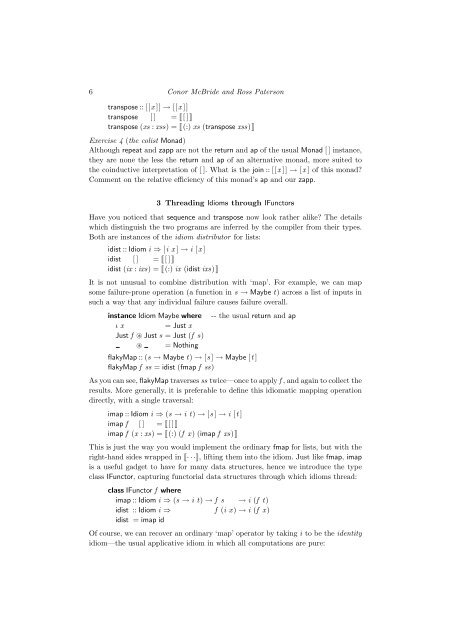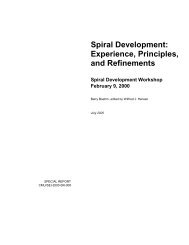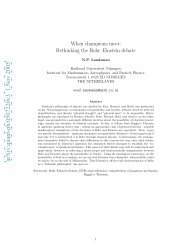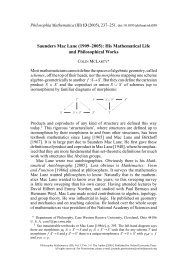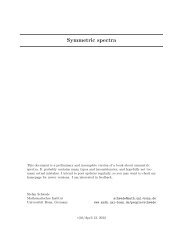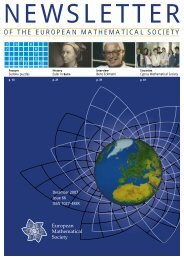Idiom
Idiom
Idiom
Create successful ePaper yourself
Turn your PDF publications into a flip-book with our unique Google optimized e-Paper software.
6 Conor McBride and Ross Paterson<br />
transpose :: [[x ]] → [[x ]]<br />
transpose [ ] = [ ]<br />
transpose (xs : xss) = (:) xs (transpose xss)<br />
Exercise 4 (the colist Monad)<br />
Although repeat and zapp are not the return and ap of the usual Monad [ ] instance,<br />
they are none the less the return and ap of an alternative monad, more suited to<br />
the coinductive interpretation of [ ]. What is the join :: [[x ]] → [x ] of this monad?<br />
Comment on the relative efficiency of this monad’s ap and our zapp.<br />
3 Threading <strong>Idiom</strong>s through IFunctors<br />
Have you noticed that sequence and transpose now look rather alike? The details<br />
which distinguish the two programs are inferred by the compiler from their types.<br />
Both are instances of the idiom distributor for lists:<br />
idist :: <strong>Idiom</strong> i ⇒ [i x ] → i [x ]<br />
idist [ ] = [ ]<br />
idist (ix : ixs) = (:) ix (idist ixs)<br />
It is not unusual to combine distribution with ‘map’. For example, we can map<br />
some failure-prone operation (a function in s → Maybe t) across a list of inputs in<br />
such a way that any individual failure causes failure overall.<br />
instance <strong>Idiom</strong> Maybe where -- the usual return and ap<br />
ι x = Just x<br />
Just f ⊛ Just s = Just (f s)<br />
⊛ = Nothing<br />
flakyMap :: (s → Maybe t) → [s ] → Maybe [t ]<br />
flakyMap f ss = idist (fmap f ss)<br />
As you can see, flakyMap traverses ss twice—once to apply f , and again to collect the<br />
results. More generally, it is preferable to define this idiomatic mapping operation<br />
directly, with a single traversal:<br />
imap :: <strong>Idiom</strong> i ⇒ (s → i t) → [s ] → i [t ]<br />
imap f [ ] = [ ]<br />
imap f (x : xs) = (:) (f x) (imap f xs)<br />
This is just the way you would implement the ordinary fmap for lists, but with the<br />
right-hand sides wrapped in · · ·, lifting them into the idiom. Just like fmap, imap<br />
is a useful gadget to have for many data structures, hence we introduce the type<br />
class IFunctor, capturing functorial data structures through which idioms thread:<br />
class IFunctor f where<br />
imap :: <strong>Idiom</strong> i ⇒ (s → i t) → f s → i (f t)<br />
idist :: <strong>Idiom</strong> i ⇒ f (i x) → i (f x)<br />
idist = imap id<br />
Of course, we can recover an ordinary ‘map’ operator by taking i to be the identity<br />
idiom—the usual applicative idiom in which all computations are pure:


